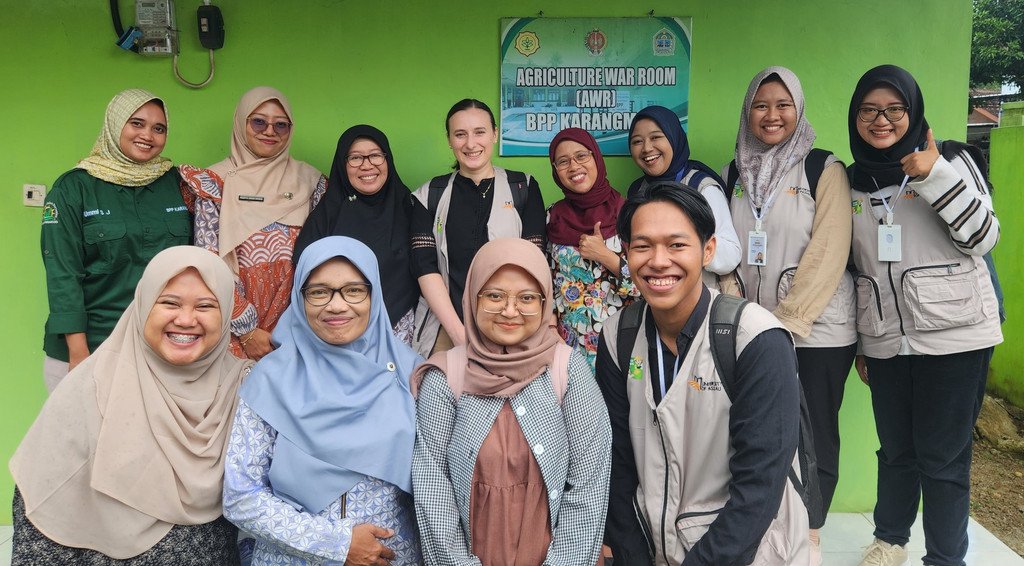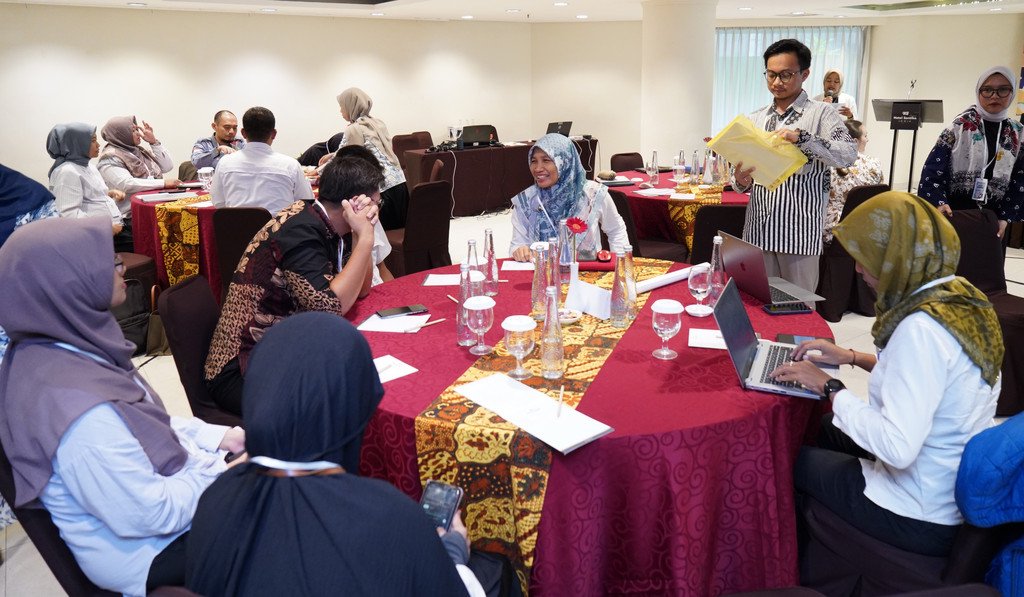Indonesia’s agricultural sector faces an aging workforce, a shortage of extension workers, and the need to achieve sustainable food supply. Integrating digital tools like the platform Lentera DESA into extension services could address these gaps simultaneously if extension workers and farmers have sufficient digital literacy levels. After addressing the potential digital literacy barriers, our project tackles these gaps by offering training and promotion of sustainable agricultural and business practices on Lentera DESA, so it can (i) increase knowledge and adoption of sustainable practices, and resilience, at individual/entrepreneurial level (ii) increase the performance and capability of the extension services, promotion and adoption of eco-friendly practices, and (III) enhance the overall productivity at the agricultural sector level. DPE at the University of Passau collaborates with the Faculty of Agriculture of Universitas Gadjah Mada to analyze the impact of a digital training intervention (LenteraDigiEx) on digital literacy, digital platform use, knowledge and adoption of sustainable agricultural and business practices by young farmers, extension workers performance and capability, and socio-economic outcomes.
The LenteraDigiEx project addresses governmental priorities like the rejuvenation of the agricultural sector, resilience to climate change, and food security offering actionable digital solutions while taking into account the resource constraints coming from a lack of extension workers a limited budget, and potential digital literacy barriers.
In particular, our intervention targets both extension workers and farmers aged 19-39 years old (“Millennial Farmers” hereafter), offering them digital literacy training and access to a tailored training on a platform, Lentera DESA, where they can obtain reliable information and skills, and interact with peers and other stakeholders. The sustainable practices promoted on the platform belong to two categories: agricultural sub-sector specific and general agribusiness practices. The first ones focus on eco-friendly activities that promote biodiversity and climate change resilience tailored to crop cultivation, livestock, fishery, and forestry, like traditional techniques, intercropping, sustainable forest management, and many more. The second ones offer information on entrepreneurial agribusiness skills focused on farm recording, e-commerce, and promotion of farming products, among others.
Previous research done by the team highlighted the potential benefits of blended learning (offline and online) over online only interventions, therefore we offer our intervention alternatively in a blended format and in a fully digital format. The cost-effectiveness comparison between the two intervention types will translate our scientific research into sustainable policy outcomes.
LenteraDigiEx is intended to be self-reinforcing and sustainable over time by: (i) transforming all trainees into digitally independent users able to navigate and connect with reliable sources; (ii) offering extension workers a platform that can support their promotion of sustainable practices by increasing their reach and capabilities. Extension workers will be able to refer farmers to a reliable source of information that they can access whenever it is convenient for them.
Treatment 1 Light (low cost) package | Treatment 2 Intense (moderate cost) package | Control | |
|---|---|---|---|
| Extension Workers | Online introductory session About Lentera DESA and how to make content for extension activities Online tailored training for extension workers on digitization | Offline introductory session About Lentera DESA and how to make content for extension activities Online tailored training for extension workers on digitization | Access to Lentera DESA |
| Millennial Farmers | Online introductory session About Lentera DESA and on sustainable practice Online tailored training for Millennial Farmers on digitization | Offline introductory session About Lentera DESA and on sustainable practice Online tailored training for Millennial Farmers on digitization | Access to Lentera DESA |
LenteraDigiEx will offer bundled interventions at the sub-district level to extension workers and Millennial Farmers of the special region of Yogyakarta. Our research team drew proportional random samples for extension workers and Millennial Farmers from 51 sub-districts, to causally estimate the impact of the intervention. Using a cluster randomized controlled trial (RCT), the training interventions are randomized at the sub-district level, where 17 sub-districts are assigned to the "intensive" extension worker training, 17 to the "light" one, and 17 to a control group. Our research team will conduct two follow-up surveys with extension workers and Millennial Farmers to assess the impact of the intervention.
Thanks to the experimental design, our research team will measure the impact of the different double-side interventions and their cost-effectiveness. They will assess the effects on digital literacy and the knowledge and adoption of the digital platform Lentera DESA by extension workers and Millennial Farmers. On the supply side, we will also examine the causal impact of LenteraDigiEx on extension capacity, performance, technology perception, and attitude of extension workers, with a special focus on digital integration in their promotion of sustainable practices. On the demand side, we will additionally consider knowledge and adoption of sustainable agricultural and business practices, resilience against climate change, income, loans and investments, and employment, analyzing the (digital) sources of their knowledge that initiated their behavioral change.
We expect that the interventions will increase digital literacy, platform knowledge, and usage. The use of the Lentera DESA platform may increase extension workers' performance and capabilities, Millennial Farmers' knowledge and use of sustainable practices, and ultimately improve their overall welfare.

After training the enumerators, our research team conducted a baseline survey in February and March 2025, with almost 1,000 randomly selected respondents (both extension workers and Millennial Farmers) in the special region of Yogyakarta. Moreover, the team from Universitas Gadjah Mada and our researcher, Irene Furlani, could collect valuable insights from the respondents and the enumerators during field visits that help the research team better understand the underlying mechanisms at play.
To engage with relevant stakeholders, the research team organized an inception workshop with local government representatives, extension workers coordinators, farmer groups, and academia. During the workshop, our research team presented the LenteraDigiEx project and gathered input on using digital platforms as learning and information tools, and the capacities needed by the extension workers and Millennial Farmers to contribute to a digital agriculture era. The workshop also served to assess potential risks and barriers to the adoption of digital extension to be considered in the interventions and which topics to focus on to address the stakeholders’ needs.

Lentera DESA is a web-based platform developed and managed by the Faculty of Agriculture, Universitas Gadjah Mada, and it is part of the DESA digital platform ecosystem that also includes the DESA (mobile) App and the Bincang DESA (webinar). It provides agricultural support targeting both extension workers and farmers. Given the digital nature of the platform, all users can access the content at any time and as often as they want (provided that they have a digital connection). All the content posted on Lentera DESA can be easily shared via links in the preferred social media, making it a source of agricultural information that is easy to use and accessible.